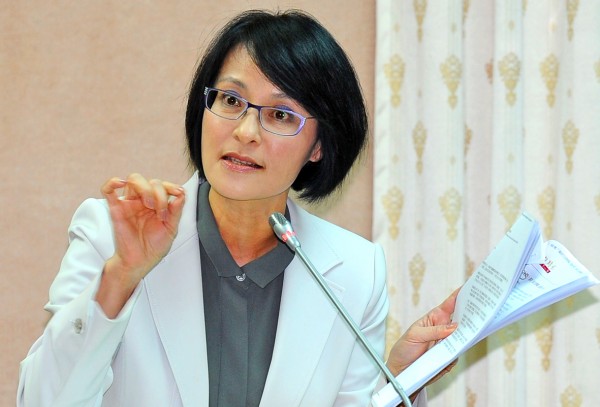《TAIPEI TIMES 焦點》 Ma misquoted on unification: ministry

Vice Minister of Foreign Affairs Vanessa Shih gestures during a question-and-answer session at the legislature in Taipei yesterday. Photo: Chang Chia-ming, Taipei Times
BILATERAL TIES: The government denied that Ma referred to Germany’s ‘ultimate unification’ as a model for cross-strait relations in an interview with foreign media
By Alison Hsiao / Staff reporter
The Ministry of Foreign Affairs yesterday said it would demand a correction after a Chinese-language report by Deutsche Welle (DW) quoted President Ma Ying-jeou (馬英九) as saying he aims to learn from the experience of East Germany and West Germany in handling bilateral relations and “their ultimate unification.”
The story was picked up by Taiwanese media outlets, which raised questions whether Ma was pushing for a similar unification between Taiwan and China.
The president met Beijing-based correspondents for Deutsche Presse-Agentur (DPA), German newspaper Allgemeine Zeitung and French newspaper Le Figaro at the Presidential Office on Monday.
The meeting was first described as a “joint interview,” but Vice Minister of Foreign Affairs Vanessa Shih (史亞平) yesterday said that it was not a “special interview,” but a “meeting with the media.”
According to DW’s Chinese-lanugage report and a German report by the DPA, Ma told the reporters that there is something to learn from the two German states’ handling of their bilateral relationship for the rapprochement between Taiwan and China. Bilateral communication led to the signing of the Basic Treaty in 1972 between West Germany and East Germany, and “it was a good step,” Ma was quoted as saying.
Ma was referring to the Permanent Mission set up by the Federal Republic of Germany in the German Democratic Republic, which he believed to be similarly possible between Taiwan and China, where mutual representative offices could be set up, the reports said.
However, the relationship between the two German states, which was based on the principle of “two states, one nation,” cannot be directly applied to the cross-strait situation, Ma reportedly said.
That is because the cross-strait relationship is not a “state-to-state” relationship, but neither is it an “in-state” relationship, Ma reportedly said.
“It’s a relationship that has until now never existed before in history,” he was quoted as saying.
However, the DPA’s English-language report on the meeting did not include any reference to Ma talking about the two German states as a model; instead, it focused on Ma’s hope to meet Chinese President Xi Jinping (習近平) on the sidelines of the APEC summit in Beijing in November.
Neither did the DPA report in German mention the word “unification” — unlike DW’s Chinese report, which led with the statement that according to Ma: “He is willing to learn from how the two German states handled their bilateral relationship and achieved ultimate unification.”
“What the president was underlining was the peace that could be maintained by the setting up of mutual representative offices, as was done in the two German states,” Shih said yesterday.
“And the ultimate unification he referred to was one between the two German states, not that [Taiwan and China] are going to achieve unification via the German model,” she added.
Shih said the report was “mistaken and came up with its own interpretation” of what the president was talking about.
“Because DW’s report is in Chinese, our media have therefore also transcribed the mistake,” she said.
Shih said the Presidential Office is working on a word-by-word transcript of the talk and the ministry would demand a correction from DW when the transcript is completed.
Despite the clarification, Democratic Progressive Party Legislator Hsiao Bi-kim (蕭美琴) slammed Ma’s denial of the similarities between the relationship between the two German states and that between Taiwan and China, calling it the president’s “self-denial” of the possibility that Taiwan and China could “join international organizations side by side.”
新聞來源:TAIPEI TIMES












